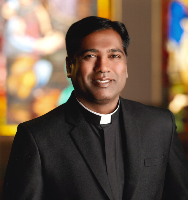|
In the gospel of this weekend, we see that what a difference the presence of Christ made in the lives of those two disciples on the road to Emmaus. The Master, whom they loved and followed, had been horribly put to death – a cruel and degrading death on a cross.
All their hopes were dashed; their dreams were shattered! Hence they were going away from Jerusalem on the aimless road towards Emmaus. Their eyes were downcast, while failing to recognize the divine stranger walking beside them, explaining to them the scriptures, at the same time hearts burning within them not knowing …why? And eventually, they stopped the journey when nightfall approached, invited the divine stranger to stay with them. What a miracle …. that the divine stranger was none other than Jesus Himself, whom they encountered at the breaking of bread. The journey to Emmaus is our journey of life, we too experience disappointments, doubts, defeats, and discouragements. We may also experience crises of faith, loss of hope, and temptations to despair. We all have some negative experiences in our lives and we are invited to recognize the powerful presence of God, when we go through hard times and challenges. The two disciples were faced with two pressing issues. 1. Crisis of faith and hope: The two Emmaus travel companions had their heaviness of hearts. Both of them knew very well what happened in Jerusalem, but they did not understand its significance and meaning. They followed Jesus, they heard his words and put their hopes in their Master for a world in which the Kingdom of God could finally be seen in peace, brotherhood, and justice. 2. Crisis of purpose: Completely lost, the two disciples decided to return to their former lives, to their former selves, to their former homes and to return to their life before Jesus. How does Jesus help the disciples to overcome these crises? 1. Dialogue: When Jesus joined the disciples on their way to Emmaus, He did not surprise them straight away. He gently walks into their day; the key to this entry is the art of dialogue. “What are you discussing as you walk along?”, he asks. And in response to Cleophas’ reply, he asks again, “What sort of things?”. Dialogue is not a pretext for debate but a path to encounter, meaningful exchange, and a path to solidarity. Jesus shows us that the art of listening is the entry point into mutual dialogue. Discern: The disciples had a hard time recognizing Jesus after his resurrection. Mary Magdalene mistook him for a gardener (John 20:15). The disciples thought he was a ghost (Luke 24:37). While fishing by the sea of Galilee, the disciples did not recognize Jesus standing on the shore (John 21:4). Similarly, the Emmaus disciples “were kept from recognizing him” (Luke 24:16). The Emmaus disciples underwent a process of discernment before recognizing the Risen Lord walking with them. Their hearts were burning and they rediscovered their zeal. And the moment they recognized the co-pilgrim as their master, they were transformed from disillusioned men to true missionary disciples. When we walk through the road of disappointments, doubts, disillusionment, and despair, let us remember that we are not walking alone, the unseen divine stranger, the risen Lord walks with us, when we Walk with Jesus, then our road will become a great highway of companionship, belief and hope Fr. Eric and I, wish to thank our parishioners who worked very hard for the celebration of the sacred triduum at St Mark Church. We thank those who decorated the church each day and made the church look so beautiful for Easter. We are so grateful to our parish staff for their tremendous contribution of time and energy for the celebration of the Sacred Paschal Triduum. We thank our choirs and musicians for their great gift of music and talent which contributed such a joy, beauty and solemnity to our celebrations. We thank all our ushers for their welcome and hospitality to our parishioners and visitors. We thank our Lectors for their solemn proclamation of God’s Word and the Extraordinary Ministers of Holy Communion for ensuring the reverent distribution of Holy Communion during the liturgical services and We too thank all our Altar Servers who served each of the ceremonies with great reverence. Let us continue to rejoice and be glad in this Easter Season and keeping all of you in my prayers.
0 Comments
|

